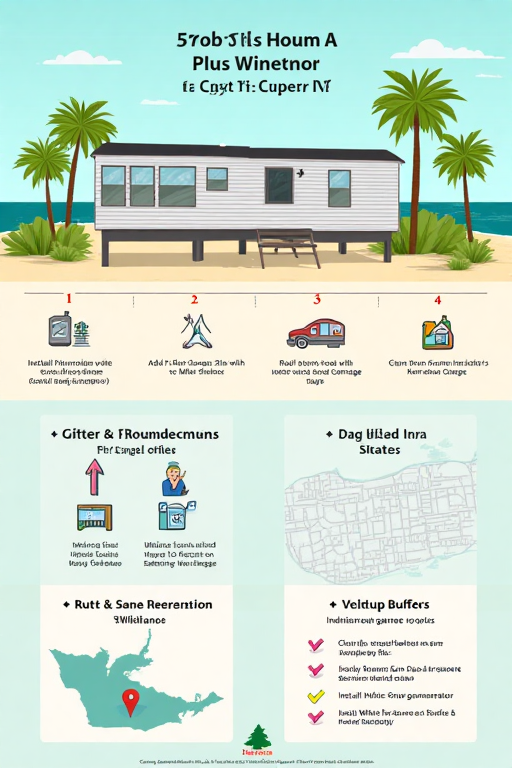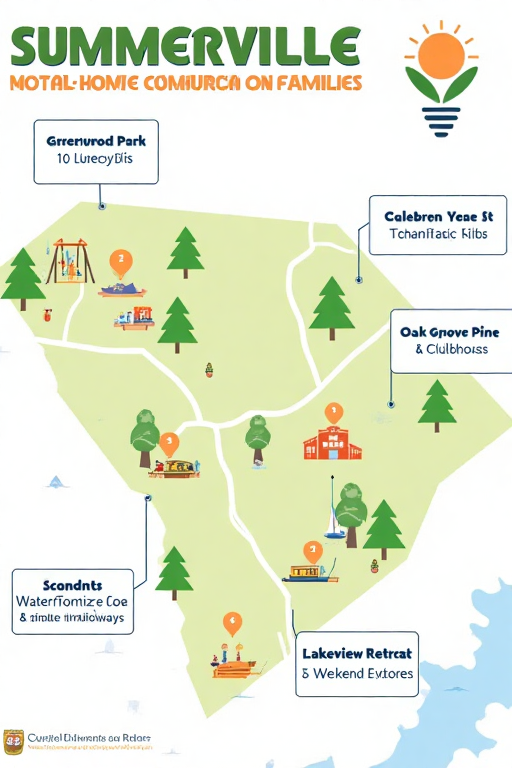When it comes to choosing a new home in South Carolina, potential buyers often find themselves comparing mobile homes and modular homes. Both options present unique benefits and considerations. In this blog post, we’ll explore the key differences, advantages, and disadvantages of mobile homes and modular homes to help you make an informed decision.

Comparative Summary
| Feature | Mobile Homes | Modular Homes |
|---|---|---|
| Cost | Generally lower initial cost | Higher initial cost, but better long-term value |
| Customization | Limited customization options | Highly customizable |
| Resale Value | Tends to depreciate | Typically appreciates in value |
| Financing | More challenging | Easier to finance |
| Construction Time | Quick setup | Longer construction and assembly |
| Energy Efficiency | Varies | Generally more energy-efficient |
1. Understanding Mobile Homes
What Are Mobile Homes?
Mobile homes, also known as manufactured homes, are built in factories and transported to their final location. They are constructed on a steel frame, making them easily movable. South Carolina has a vibrant market for mobile homes, catering to various lifestyles and needs.
Key Features
- Affordability: Mobile homes are often less expensive than traditional site-built homes, making them an attractive option for first-time buyers or those looking to downsize.
- Flexibility in Location: Mobile homes can be placed on private lots or in mobile home parks, giving buyers options regarding their living environment.
- Quick Setup: These homes can be set up and ready for occupancy relatively quickly compared to site-built homes.
Considerations
- Depreciation: Mobile homes tend to depreciate in value over time, similar to vehicles. This can affect resale potential.
- Financing Challenges: Securing financing for a mobile home can be more complex than for a traditional home, often requiring higher interest rates.
- Land Ownership: If you own the land, you can build equity; however, if placed in a park, you may have limited control over the property.
Selling Your Mobile Home in South Carolina
For those looking to sell, companies like Faith Mobile Home Solutions specialize in buying mobile homes in any condition. They offer hassle-free cash offers and can help sellers navigate the process efficiently.
2. Understanding Modular Homes
What Are Modular Homes?
Modular homes are also built in factories but are constructed in sections (modules) and assembled on-site. Unlike mobile homes, they are built to the same building codes as traditional homes and can offer a more permanent living solution.
Key Features
- Customization: Modular homes often come with various customizable floor plans and features, allowing buyers to tailor their homes to their preferences.
- Higher Resale Value: Generally, modular homes appreciate in value over time, similar to traditional site-built homes.
- Energy Efficiency: Many modular homes are designed with energy-efficient materials and techniques, resulting in lower utility costs.
Considerations
- Initial Cost: While modular homes can be more expensive than mobile homes, their long-term value and energy efficiency may offset the initial investment.
- Building Time: Modular homes take longer to construct than mobile homes, as they require site preparation and assembly.
- Financing Options: Buyers may find it easier to secure traditional mortgage financing for modular homes compared to mobile homes.
Building Your Modular Home in South Carolina

For those considering a modular home, Faith Modular Home Solutions offers a range of customizable options. Their process includes consultations to help you choose the right floor plan and design that suits your lifestyle and budget.
What are the typical land requirements for each home type?
Mobile Homes:
- Zoning: Must comply with local zoning regulations, which may dictate whether mobile homes can be placed on certain types of land.
- Lot Size: Usually require a minimum lot size, often around 0.25 acres, but this can vary by county.
- Foundation: Can be placed on a concrete slab or piers, but the foundation must meet local building codes.
Modular Homes:
- Zoning: Similar to mobile homes, modular homes must adhere to local zoning laws, which may be more lenient due to their compliance with state building codes.
- Lot Size: Generally require larger lots, often starting from 0.5 acres, depending on the design and local regulations.
- Foundation: Must be placed on a permanent foundation that meets local building codes, which can include crawl spaces or basements.
How does property tax differ between mobile and modular homes?
Mobile Homes:
- Typically classified as personal property (like vehicles) and depreciate in value over time.
- Property taxes may be assessed based on the home’s value and can be higher due to depreciation.
- Owners may also pay taxes on the land separately if they own it.
Modular Homes:
- Generally classified as real estate, similar to traditional site-built homes.
- Property taxes are assessed based on the value of the home and the land it occupies, usually leading to a more stable tax valuation over time.
- Modular homes tend to appreciate in value, potentially resulting in higher property taxes over the long term.
Can you provide examples of modular home designs popular in South Carolina?
Ranch-Style Modular Homes:
- Single-story layout, often with an open floor plan.
- Features wide porches and large windows, ideal for enjoying the southern landscape.
Cape Cod Modular Homes:
- Characterized by steep roofs and dormer windows.
- Typically two stories, making them suitable for larger families.
Craftsman-Style Modular Homes:
- Features include exposed beams, built-in furniture, and a rustic aesthetic.
- Often designed with front porches and detailed woodwork.
Modern Modular Homes:
- Sleek lines, large glass windows, and an emphasis on energy efficiency.
- Customizable layouts to fit contemporary tastes.
Split-Level Modular Homes:
- Multi-level design that separates living spaces.
- Ideal for families seeking distinct areas for different activities.
How do building permits differ for modular vs. mobile homes?
Building permits for modular and mobile homes differ significantly due to their construction standards and regulatory classifications. Here’s a breakdown of how they compare:
Building Permits for Mobile Homes
- Classification:
- Mobile homes (manufactured homes) are considered personal property and are subject to different regulations than real estate.
- Permit Requirements:
- While mobile homes themselves may not require a traditional building permit, the placement and installation on a property often do.
- Local zoning laws will dictate whether a mobile home can be placed in a specific area, which may require permits.
- Site preparation (such as clearing land or setting up utilities) may require additional permits.
- Inspections:
- Inspections for mobile homes are typically less rigorous than those for modular homes. However, local jurisdictions may require inspections for the installation process to ensure safety and adherence to local codes.
Building Permits for Modular Homes
- Classification:
- Modular homes are classified as real estate and are built to the same building codes as traditional site-built homes, which can vary by state and locality.
- Permit Requirements:
- Modular homes require a building permit before construction can begin. This includes submitting plans that comply with local building codes.
- Permits are needed for site preparation, foundation work, and utility connections, all of which must adhere to local regulations.
- Inspections:
- Modular homes undergo more comprehensive inspections both in the factory (to ensure they meet building codes) and on-site during assembly.
- Local building departments may conduct inspections at various stages of construction, including foundation, utility connections, and final occupancy.
Summary
- Mobile Homes: Generally have fewer permit requirements and inspections, focusing mainly on placement and site preparation.
- Modular Homes: Require more extensive permitting and inspections due to their classification as real estate and adherence to local building codes.
Always check with local building authorities for specific requirements, as regulations can vary widely between different jurisdictions in South Carolina.
Conclusion
Choosing between a mobile home and a modular home in South Carolina ultimately depends on your personal needs, budget, and long-term goals. Mobile homes offer affordability and flexibility, making them suitable for many buyers. In contrast, modular homes provide customization, energy efficiency, and better resale potential.
When considering your options, it’s beneficial to consult with experts in the field. Whether you decide to sell a mobile home or explore modular home solutions, companies like Faith Mobile Home Solutions and South Carolina Mobile Home Buyer can guide you through the process, ensuring you make the best choice for your future.
Data and Study By Local Business Press




